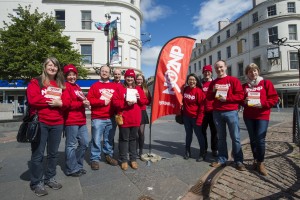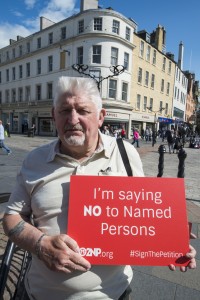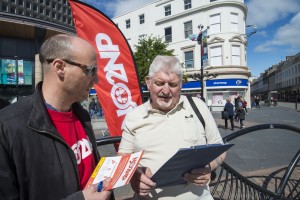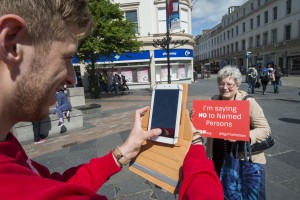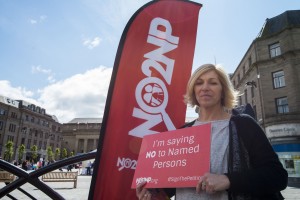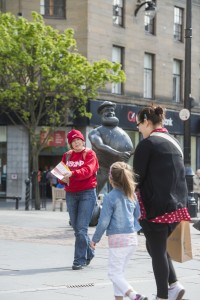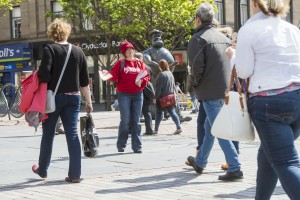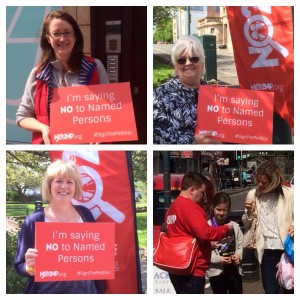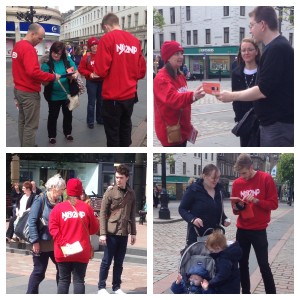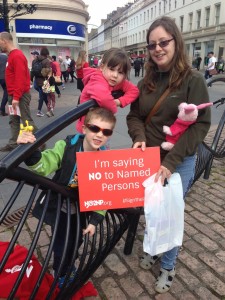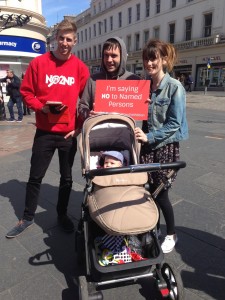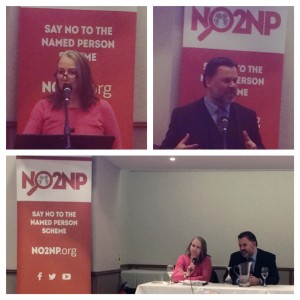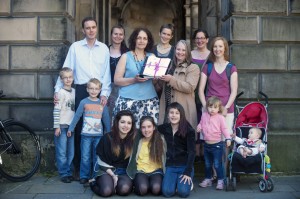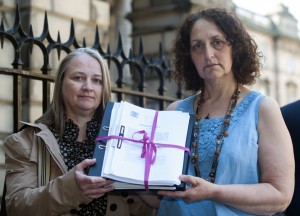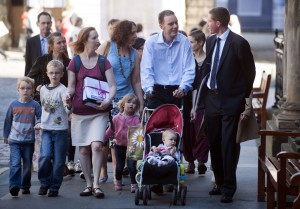Blog
Keeping you up to date on the progress of the Named Person scheme and the NO2NP campaign.
NAMED PERSON LEGAL CHALLENGE BEGINS IN SUPREME COURT TODAY
Posted 10 years agoThis morning proceedings will begin at the UK Supreme Court in London in the continued fight to oppose the Scottish Government’s Named Person legislation.
Last year judges in Scotland’s highest court ruled that the legislation did not conflict with human rights or data protection laws.
But groups and individuals involved in the NO2NP campaign appealed the decision, taking the case to the Supreme Court.
The hearing will last two days and be heard by five judges.
Watch the hearing live from 10:30am on the Supreme Court website.
There has been continued widespread media coverage on the Named Person issue in recent days, including articles in The Herald, The Scotsman, the Scottish Daily Mail, the Scottish Daily Express and on the front page of the Scottish Daily Telegraph.
Keep up with all the latest news coverage via our social media pages on Facebook and Twitter.
TEEN PREGNANCY: DEFINITELY INFORM NAMED PERSON, BUT NOT SURE ABOUT PARENTS, SAYS GOVERNMENT QC
Posted 11 years agoDuring last week’s appeal hearing against the Named Person law, the Scottish Government’s QC told the court that if a young girl was in hospital and discovered to be pregnant then the Named Person would definitely be contacted…but didn’t seem to know whether the parents would be informed.
Alistair Clark QC, representing the Scottish Government, was meant to be defending the scheme but instead managed to present a convincing case as to why the Named Person would be damaging for families.
Clark’s comments regarding teenage pregnancy reveal one of the major flaws with the Named Person scheme – it would bypass parents.
As we reported earlier in the week Clark also told judges during the hearing that the scheme was needed because every child in Scotland was deemed to be “potentially vulnerable”.
This greatly undermines ordinary Scottish families and is chilling stuff from the Scottish Government’s QC.
Any Government scheme which puts parents in second place after the state in relation to their own children is flawed from the outset.
Aidan O’Neill QC, representing those bringing the legal challenge, said the Named Person would be “a state functionary who has the power to interfere in the lives of every child in Scotland and in family life…the power to come between the child and their parents”.
He added that the Named Person’s powers to obtain and share confidential data on families without consent or veto constituted further interference.
The judges are currently considering their verdict, which is expected to take several weeks.
The Named Person provisions are contained in the Children and Young People (Scotland) Act, which was passed by the Scottish Parliament last year. The scheme is due to be rolled out across Scotland in 2016. Some areas of Scotland already have a non-statutory Named Person pilot scheme in operation but they do not have the full range of legal powers contained in the Act.
‘All children potentially vulnerable’, Scottish Government QC tells judge
Posted 11 years agoLast week’s appeal hearing rehearsed many concerning reasons why the Named Person scheme is not compatible with a free and democratic society, but perhaps the most revealing and worrying comment came from the Scottish Government’s QC.
Pressed by Lord Malcolm on why every child needed to have a Named Person, when not all of them were at risk, Alistair Clark QC, representing the Scottish Government, stated that every child was deemed to be “potentially vulnerable”.
Mr Clark’s words expose the thinking behind these intrusive plans.
A NO2NP spokesman said: “The assumption that all Scottish children are potentially vulnerable is patronising to all ordinary parents trying to do their best to bring up their children.
“The Scottish Government is saying to normal mums and dads that they all need the state to be a co-parent to stop them leaving their child potentially vulnerable.
“This unwarranted intrusion into family life is undermining and unnecessary.”
During the appeal hearing last week Aidan O’Neill QC, representing those bringing the legal challenge against the Named Person, addressed conflict between respect for the family and responsibility for the protection of children from harm.
He said there was no pressing social need requiring interference in the lives of every family and said: “The overwhelming majority of children are not neglected and the Named Person scheme subverts family life and supplants parents.”
He said: “We accept there is a legitimate state interest in the protection of the vulnerable, but this is not just dealing with the vulnerable, it’s dealing with all children.
“Most families do not need the state to get involved. Some parents – a tiny minority – do cause harm to their children but that does not justify appointing a named person to every child.”
Mr O’Neill pointed out that the Named Person scheme had been drawn up to promote children’s ‘wellbeing’ – a concept which, according to the Government, can include everything from mental health to a “wider vision of happiness”. He responded, “That’s what parents do and have done through the ages. It’s not the state’s job.
Mr O’Neill raised the concern that the central assumption behind the scheme is that “the state knows best”.
‘THIS IS WORSE THAN THE NANNY STATE’, QC TELLS COURT ON DAY 1 OF APPEAL
Posted 11 years agoYesterday, Aidan O’Neill QC, representing campaigners challenging the Named Person scheme, told Scotland’s highest court that the plan to give every child in Scotland a state guardian was “incompatible with the fundamental rights of a democratic society”.
O’Neill, a leading human rights expert, said the scheme created a situation “worse than a nanny state because the nanny is at least responsible to the family”.
He was speaking at the start of the appeal hearing by opponents of the Named Person legislation, after Lord Pentland rejected their initial bid last year.
During the appeal, in Edinburgh’s Court of Session, Mr O’Neill said the state should support the family in the upbringing of children as the family is the fundamental group unit of the state and entitled to state protection.
He said the Universal Declaration of Human Rights was written to counter Nazi and Fascist totalitarian states which placed value on “uniformity and conformity” and to point out that “the child is not the mere creature of the state”.
He told the court the scheme didn’t require families to give consent and offered no chance to opt in or out and said: “The presumption is every child needs a named person. That is wrong. The vast majority of parents bring up their children perfectly well. For the state to assume a responsibility for every child regardless of need or threat of harm is to go beyond what we properly expect from a democratic society that respects families and respects diversity.”
Based on the guidance issued by the Scottish Government he also drew attention to the fact that: “Not only can you not opt out of the scheme you have to positively co-operate with the named person otherwise you could be characterised as ‘hostile’ or ‘non-engaging’ which leads to further state involvement. ”
He said the compulsory nature of the law and the need to collate data on every child would result in “white noise” meaning “those who do need help get lost”.
Mr O’Neill recognised that there are conflicting issues between respect for the family and responsibility for the protection of children from harm. But he said there was no pressing social need requiring interference in the lives of every family and continued: “The overwhelming majority of children are not neglected and the Named Person scheme subverts family life and supplants parents.”
He said the scheme was drawn up to promote ‘wellbeing’ (which can include everything from mental health to a “wider vision of happiness”) among children but said: “That’s what parents do and have done through the ages. It’s not the state’s job.
“We accept there is a legitimate state interest in the protection of the vulnerable, but this is not just dealing with the vulnerable, it’s dealing with all children.
“Most families do not need the state to get involved. Some parents – a tiny minority – do cause harm to their children but that does not justify appointing a named person to every child.”
He said the central assumption behind the scheme is that “the state knows best” whereas families “are the breeding ground of diversity and individuality”.
The legal action is being brought by The Christian Institute, CARE, TYMES Trust and the Family Education Trust, with the support of academics and individual parents, all of which support the NO2NP campaign.
The appeal before Lord Carloway, Lord Malcolm and Lord Bracadale continues today with the Scottish Government’s response.
The Named Person scheme is part of the Children and Young People (Scotland) Act and is expected to be implemented nationwide in 2016.
NAMED PERSON APPEAL HEARING: Campaigners back in court today
Posted 11 years agoCampaigners opposing the Named Person scheme are back in court today for an appeal hearing after their legal challenge was rejected last year.
Lord Pentland rejected arguments that MSPs had exceeded their powers, breaching human rights rules and data protection laws, in a Judicial Review aimed at having the legislation overturned.
Now three judges will consider the proposals again.
The legal action is being brought by The Christian Institute, CARE, TYMES Trust and the Family Education Trust, with the support of academics and individual parents, all of which support the NO2NP campaign.
Community Law Advice Network (Clan Childlaw), a charity that provides legal help for children, also raised concerns about the scheme and announced it will intervene in the case.
Simon Calvert of The Christian Institute, said: “We’re asking the court to make a ruling that the imposition of a Named Person on every child in Scotland is unconstitutional and a breach of the right to a private family life.
He said they wanted the “court to look behind the Government’s rhetoric and see how this is not about protecting vulnerable children. It is about making the state a co-parent, with power to second-guess and over-ride parenting decisions about what makes a child happy. It’s Government-approved-parenting writ large”.
He added: “The trigger for intervention by the Named Person is not where there is a ‘risk of harm’. The threshold at which the Named Person can intervene in the lives of Scottish families is merely the ‘promotion of well-being’.
“The Named Person is, in effect, legally empowered to police the happiness of Scottish children. He can access and share their confidential medical data, their school records, he can question children and give them advice and supply services to them without their parents’ consent – all on the basis of what he thinks is most likely to make them happy. That is an outrage. Thousands of people across Scotland know it is an outrage, and that’s why they’ll all be hoping our judicial review succeeds.”
Media Round Up: NO2NP Petition Launch and Action Day
Posted 11 years agoMedia coverage of the NO2NP petition launch and Action Day
‘Named person’ opponents step up campaign
The Scotsman, 31 May 2015
‘Named person’ opponents campaign
The Courier, 31 May 2015
‘Named person’ opponents campaign
Press and Journal, 31 May 2015
‘Named person’ critics step up campaign
BBC News, 31 May 2015
Fresh campaign to fight ‘state guardian’ scheme
The Sunday Times (£), 31 May 2015
Campaign against ‘named person’ plan steps up ahead of court ruling
STV, 31 May 2015
Protesters gathering names against named persons law in Dundee
The Courier, 30 May 2015
Petition officially launches on first NO2NP Action Day
Posted 11 years agoOn Saturday NO2NP officially launched its online petition to oppose the Scottish Government’s Named Person scheme. Volunteers took to the streets of Dundee to help raise awareness of the campaign by giving out leaflets to the public and gathering signatures for the petition.
A team of volunteers were also out in Kirkintilloch, the constituency of the Minister for Children and Young People.
The petition doubled in size over the launch weekend, and now has more than 4,500 signatures. Sign and share the petition here.
NO2NP Roadshow speakers Dr Stuart Waiton, a sociologist and lecturer at Abertay University, and Lesley Scott, from Tymes Trust, joined volunteers at the Dundee Action Day.
The Action Day and petition launch comes ahead of the appeal hearing by campaigners opposing the Named Person scheme, due to be heard in the Court of Session this Wednesday and Thursday.
A spokesman for NO2NP said: “We remain deeply concerned about the threats to the human rights of families to their privacy in their own homes as well as the breaches of data protection laws as the state passes confidential family information to and from different public bodies.
“The state thinks the named person – a health visitor, a teacher or other professional – can fulfil the role better than mums and dads which is ridiculous.
“It’s vitally important that the higher courts consider this issue, because it’s driving a coach and horses through parents’ rights and private family life.”
NO2NP Action Day: Dundee and Kirkintilloch, Saturday 30th May.
NO2NP Roadshow: Elgin highlights
Posted 11 years agoThe campaign saw strong support in Elgin last night as concerned parents and individuals, with some traveling quite a distance, turned out for the latest NO2NP Roadshow.
Nigel Kenny of The Christian Institute explained that the campaign was made up of a broad coalition of organisations and individuals from academia, charities, education, medicine, politics and social work. He said all those involved have a shared concern for the importance and autonomy of the family in raising the next generation.
Videos were shown, the first explaining the background to the campaign, and the second from First Minister’s Questions last week, when NO2NP supporter Liz Smith MSP challenged Nicola Sturgeon over Clan (Community Law Advice Network) Childlaw’s concerns about data sharing.
Lesley Scott from Tymes Trust then spoke about the blueprint for every child’s life that has been planned under the GIRFEC (Getting It Right For Every Child) model, including the Wellbeing Wheel, the My World Triangle and the Resilience Matrix. She pointed out that Edinburgh University had identified no fewer than 304 outcomes that could arise from the SHANARRI “wellbeing” indicators.
Nigel finished off the talks with an update on the judicial review appeal (due to be heard in Edinburgh on 3rd and 4th June) and some tips on how people can get involved with the campaign.
There was a lively and extended Q&A at the end, where people expressed their deep concerns about the negative impact that the scheme will have on families, schools and society at large.
The NO2NP Roadshow will be stopping off at Falkirk next on Wednesday 27th May, when we’ll be at the Best Western Park Hotel in Camelon Road at 7.30pm. Hope to see you there if you live in and around the area!
NO2NP Roadshow: Aberdeen highlights
Posted 11 years agoThe latest NO2NP Roadshow event was held in the Aberdeen Arts Centre on Monday (11th May), where one local woman’s run in with an emanation of the Named Person scheme at her daughter’s school was raised during Q&A as a matter of concern. Even more concern was expressed when it was revealed that a GP would be obliged to share confidential patient details about, for example, a mother’s struggle with depression with her child’s Named Person.
After a video was shown about the judicial review in the Court of Session, Abertay University sociology lecturer Dr Stuart Waiton spoke about the disjuncture between the people and the powerful and how, over the past century, children were no longer being seen in the context of their families and government was increasingly seeing its role as one of “risk management”.
Lesley Scott of Tymes Trust then made reference to the quote in a recent newspaper article by Acting Minister for Children and Young People that the Named Person legislation “is about making sure that we are doing everything in our power to protect vulnerable children.” Lesley then pointed out that the word ‘vulnerable’ does not appear anywhere in the legislation or in the draft statutory guidance. Instead, she said “this legislation is about measuring the wellbeing of each and every child.”
Some practical points on how people can be involved in helping the NO2NP campaign were then shared by Nigel Kenny of The Christian Institute, before a lively Q&A, always one of the high points of these Roadshows.
Our next event is in Elgin this coming Monday (18th May) at the Laighmoray Hotel, Maisondieu Road, Elgin, IV30 1QR at 7.30pm – please do come along and find out more about the campaign.
NO2NP campaign – Latest developments
Posted 11 years agoThe NO2NP campaign is gearing up for a busy year ahead, with three roadshow events organised over the next few weeks. The first is next Wednesday (21st January) at Howden Park Centre in Livingston where speakers will include social services consultant Maggie Mellon, Tymes Trust representative Lesley Scott, and James McIntosh, a parent who has already been affected by the scheme. The meeting will start at 7:30pm, is free, and all are welcome
Meanwhile, media interest in the named person continues. Writing in The Daily Mail last week, commentator Gerald Warner accused politicians of having “nationalised our children” noting that “legislation has recently been passed marginalising parents’ authority over children by the appointment of a ‘named person’ to monitor minors on behalf of the State.”
In terms of the next developments for the campaign, we await the commencement of The Scottish Government’s consultation on guidance to accompany the legislation, as well as the legal judgment on the judicial review which has been lodged against the scheme.
Media Coverage of the Named Person legal action
Posted 11 years agoThe much anticipated legal challenge against the Scottish Government’s controversial Named Person provisions got underway this week in Edinburgh’s Court of Session. Aidan O’Neill QC is representing the campaigners opposing the scheme and warns that plans for a Named Person for every child in Scotland is a “dangerous route to go down”.
See the latest news roundup on the court case:
Lawyer slams SNP’s state guardian project
Scottish Daily Express
Legal challenge to child guardian plan begins
The Scotsman
Legal challenge to ‘named person’ bill starts
The Herald (£)
Named person legal challenge starts
The Courier
Named guardian legal bid to start
BBC News
Named persons legal bid to start
Press and Journal
The scale of opposition to the child guardian plan suggests the SNP has got it wrong
The Telegraph
Named persons legal bid to start
The Courier
Legal fight starts over SNP ‘state guardian for every child’
The Telegraph
Challenge to child guardians law begins
The Times (£)
Named person legal challenge starts
Glasgow Evening Times
Named person legal action gets under way
Posted 11 years agoThis week, the long-awaited judicial review of the Named Person provisions of the Children & Young People (Scotland) Act is being heard at the Court of Session in Edinburgh. With the law having been passed by the Scottish Parliament earlier in the year, the only route left to stop the implementation of the scheme is via the courts.
Several of the organisations who are supporting the NO2NP campaign are spear-heading the legal action, namely The Christian Institute, Tymes Trust, CARE and Family Education Trust.
Leading human rights lawyer Aidan O’Neill QC is representing the petitioners in court. He has previously stated that “the blanket nature of this [named person] provision constitutes a disproportionate and unjustified interference with the right to respect for individual families’ private and family life”.
The case this week is focusing on four key legal arguments:
- Data protection: The compatibility of the Named Person legislation with data protection rules.
- Privacy: Article 8 of the European Convention on Human Rights (ECHR) entitles people to a private and family life.
- Education: Parents have a right to have their children educated in accordance with their beliefs.
- Religious liberty: Article 9 of ECHR protects the religious freedom of parents and children.
Media Coverage of the Named Person legal challenge launch
Posted 12 years agoLegal papers challenging the Scottish Government’s Named Person plans were lodged at Edinburgh’s Court of Session yesterday. There is widespread opposition to the proposals and concerned parents and other groups turned up to help deliver the documents under the spotlight of the media.
Here is a round up of the news reports.
Group take campaign against ‘named guardian’ plans to court
STV News
Bid to block named person plan goes to Court of Session
BBC News
Scottish child guardian bid faces legal challenge
The Scotsman
SNP’s state guardian plan is ‘against the law’ say court challengers
Scottish Daily Express
Nationalists’ nanny state must leave families alone
Scottish Daily Express
Campaigners start court fight against child guardian law
The Herald
Legal bid to scrap the state snoopers
Scottish Daily Mail
Opponents of ‘named person’ policy begin legal challenge
The Telegraph (Scotland)
Dangerous move by the state
The Press and Journal
Legal bid to tackle Scots guardian bill
The Press and Journal
Challenge to guardian law in court
The Courier & Advertiser
Child guardian challenge lodged
The Glasgow South and Eastwood Extra
Video: Named Person legal action launched
The Christian Institute
Scotland Issuing Government Guardian For Every Child, Act Sparks Backlash
Inquisitr
NAMED PERSON LEGAL CHALLENGE LAUNCHED
Posted 12 years agoThe legal challenge to stop the Scottish Government appointing a ‘state guardian’ for every child in the country up to the age of 18 was launched today.
Legal papers formally challenging Holyrood’s controversial Named Person plans were lodged at Edinburgh’s Court of Session this morning.
There was widespread interest as national news networks such as the BBC, STV, The Scotsman and The Herald, plus a host of other local networks, gathered outside the court to watch the crowd of concerned parents and other groups hand in the documents.
NO2NP is backing the legal action which asserts that the Scottish Government is acting illegally and exceeding its powers by setting up the Named Person scheme.
The campaign has a wide range of supporters, including academics, medical experts, social services professionals and many concerned parents.
Critics of the scheme, which is contained within the Children and Young People (Scotland) Act, say it contravenes the European Convention on Human Rights.
Colin Hart, Director of The Christian Institute, which is one of the petitioners in the case, said: “This marks the beginning of a landmark case which has implications for every family in Scotland. We are making a stand for all mums and dads who are doing their best for the children they love.
“We are not prepared to stand by and watch as the roles of parents and their rights to a family life are diminished and trampled over by an authoritarian big brother government intent on making its presence felt in every living room in the land.”
NO2NP will be staging a series of public meetings across Scotland as support for the campaign spreads. Events will take place in Glasgow, Dundee, Stirling and Inverness, with more expected.
The court case is being funded by more than 70 different sources. The court papers were lodged by The Christian Institute, the Christian charity CARE (Christian Action Research and Education), The Young ME Sufferers (Tymes) Trust, and the Family Education Trust.
They have been joined in the case by parents James and Rhianwen McIntosh from Bonnybridge and Deborah Thomas from Comrie.






